Deregulation of STING Signaling in Colorectal Carcinoma Constrains DNA Damage Responses and Correlates With Tumorigenesis
- PMID: 26748708
- PMCID: PMC4845097
- DOI: 10.1016/j.celrep.2015.12.029
Deregulation of STING Signaling in Colorectal Carcinoma Constrains DNA Damage Responses and Correlates With Tumorigenesis
Abstract
Stimulator of interferon genes (STING) has been shown to be critical for controlling antiviral responses as well as anti-tumor adaptive immunity, but little is known regarding its regulation in human tumors. Here, we report that STING signaling is recurrently suppressed in a wide variety of cancers, including colorectal carcinoma. Loss of STING signaling impeded DNA damage responses accountable for generating key cytokines that facilitate tissue repair and anti-tumor T cell priming, such as type I interferons (IFNs). Correspondingly, defective STING function was also highly predictive of effectual DNA-virus-mediated oncolytic activity. Thus, impaired STING responses may enable damaged cells to evade host immunosurveillance processes, although they provide a critical prognostic measurement that could help predict the outcome of effective oncoviral therapy.
Copyright © 2016 The Authors. Published by Elsevier Inc. All rights reserved.
Figures
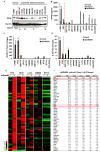
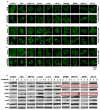
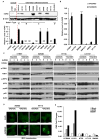
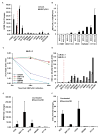
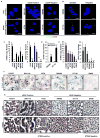
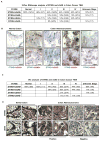
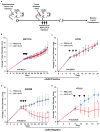
Similar articles
-
Suppression of STING signaling through epigenetic silencing and missense mutation impedes DNA damage mediated cytokine production.Oncogene. 2018 Apr;37(15):2037-2051. doi: 10.1038/s41388-017-0120-0. Epub 2018 Jan 25. Oncogene. 2018. PMID: 29367762 Free PMC article.
-
Recurrent Loss of STING Signaling in Melanoma Correlates with Susceptibility to Viral Oncolysis.Cancer Res. 2016 Nov 15;76(22):6747-6759. doi: 10.1158/0008-5472.CAN-16-1404. Epub 2016 Sep 28. Cancer Res. 2016. PMID: 27680683
-
Diverse roles of STING-dependent signaling on the development of cancer.Oncogene. 2015 Oct 8;34(41):5302-8. doi: 10.1038/onc.2014.457. Epub 2015 Feb 2. Oncogene. 2015. PMID: 25639870 Free PMC article.
-
The emerging role of stimulator of interferons genes signaling in sepsis: Inflammation, autophagy, and cell death.Acta Physiol (Oxf). 2019 Mar;225(3):e13194. doi: 10.1111/apha.13194. Epub 2018 Oct 22. Acta Physiol (Oxf). 2019. PMID: 30269441 Review.
-
New perspectives on type I IFNs in cancer.Cytokine Growth Factor Rev. 2015 Apr;26(2):175-8. doi: 10.1016/j.cytogfr.2015.01.001. Epub 2015 Jan 7. Cytokine Growth Factor Rev. 2015. PMID: 25630967 Free PMC article. Review.
Cited by
-
The tumor cell-intrinsic cGAS-STING pathway is associated with the high density of CD8+ T cells after chemotherapy in esophageal squamous cell carcinoma.Esophagus. 2024 Apr;21(2):165-175. doi: 10.1007/s10388-024-01044-0. Epub 2024 Feb 7. Esophagus. 2024. PMID: 38324215
-
Cancer Epigenetics, Tumor Immunity, and Immunotherapy.Trends Cancer. 2020 Jul;6(7):580-592. doi: 10.1016/j.trecan.2020.02.003. Epub 2020 Mar 31. Trends Cancer. 2020. PMID: 32610068 Free PMC article. Review.
-
STING protects breast cancer cells from intrinsic and genotoxic-induced DNA instability via a non-canonical, cell-autonomous pathway.Oncogene. 2021 Dec;40(49):6627-6640. doi: 10.1038/s41388-021-02037-4. Epub 2021 Oct 8. Oncogene. 2021. PMID: 34625708
-
Protocol to induce and assess cGAS-STING pathway activation in vitro.STAR Protoc. 2022 May 14;3(2):101384. doi: 10.1016/j.xpro.2022.101384. eCollection 2022 Jun 17. STAR Protoc. 2022. PMID: 35600929 Free PMC article.
-
Activation of Stimulation of Interferon Genes (STING) Signal and Cancer Immunotherapy.Molecules. 2022 Jul 20;27(14):4638. doi: 10.3390/molecules27144638. Molecules. 2022. PMID: 35889509 Free PMC article. Review.
References
-
- Ahn J, Barber GN. Self-DNA, STING-dependent signaling and the origins of autoinflammatory disease. Current opinion in immunology. 2014;31:121–126. - PubMed
MeSH terms
Grants and funding
LinkOut - more resources
Full Text Sources
Other Literature Sources
Medical
Molecular Biology Databases
Research Materials

